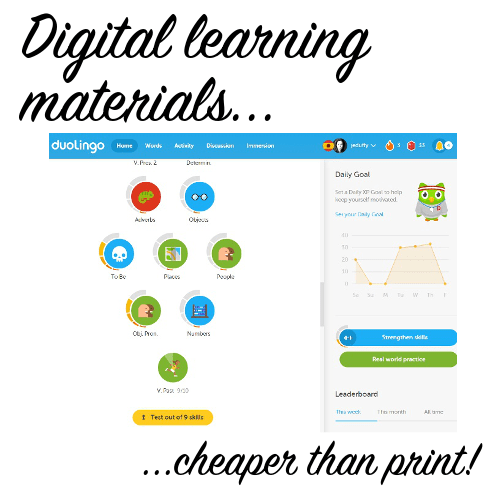Imagine that – somehow – you’ve never used the internet before. A good friend and long-time internet user finds this out and begins trying to describe to you how awesome the internet is. However, for some inexplicable reason, all of his arguments for why you should be on the internet focus on cost.
While it is absolutely true that each of these services is cheaper than its pre-internet counterpart, cost is far and away the least interesting thing about any of them. Would these arguments actually inspire someone to want to use the internet? If you’re already familiar with the internet, the whole line of argument seems to miss the point. It omits the heart and soul of what makes the internet amazing. Who thinks about the internet this way?
Yesterday IHE published an article about the “inclusive access” programs offered by most major textbook publishers. These are purchasing programs in which “institutions are signing up whole classes of students to automatically receive digital course materials at a discounted rate, rather than purchasing individually.”
What problem does the inclusive access model purport to solve? The inappropriately high cost of textbooks. Here’s a VP from Pearson:
Tim Peyton, vice president of strategic partnerships at Pearson, said it was no secret that publishers like Pearson had made textbooks too expensive and had seen sales drop as a result. “The print model is really a broken business model for us,” he said, adding, “we’re thinking about how to move away from print, and move towards digital” …. Publishers can offer discounts of up to around 70 percent with inclusive access because their customer share is increasing, explained Peyton.
While everyone wants educational materials to be less expensive, lower costs are the least interesting thing about digital, networked learning.
The inclusive access model’s goal of reducing the cost of textbooks apparently reminded the article’s author of OER, because she includes some discussion of OER toward the end of the article. However, like many others outside the immediate OER community, this author seems unaware that there is anything more to OER than “free textbooks” that – just like the inclusive access model – make education more affordable. When interviewees Nicole Allen and Rajiv Jhangiani try to discuss some of the problems that are unsolved by the inclusive access model, it feels like the author struggles to understand them because they don’t relate to cost. And obviously, both inclusive access and OER are about solving the cost problem.
By focusing on cost, the article takes a page directly from the publishers’ playbook. Keeping the conversation laser-focused on cost is the core of their defensive strategy with regard to OER. Because when you think the problem to be solved is the high cost of textbooks, the way you solve that problem is by lowering the cost of textbooks. When you think the problem to be solved is the high cost of textbooks, inclusive access programs and OER adoption are just two competing approaches to solving the problem.
Can you see it? When we focus on cost, we put inclusive access and OER on equal footing. When our presentations and our writing and our speaking and our advocacy focus primarily on ways that OER alleviate the cost problem, we’re actually doing exactly what publishers want. In June I wrote,
the free versus affordable [i.e., cost-focused] debate is … a decoy. A distraction. A first class, super skillful, street corner magician “look over here so you don’t see what’s happening over there” sleight of hand. When OER advocates say “free” and publishers say “affordable,” launching into an argument about the distance between those two positions … it’s an easy debate to get lost in. Certainly interesting enough to consume your attention for an entire webinar. However, the true strategy here isn’t to narrow the distance between free and affordable in the mind of the listener (though you might think it is). The real purpose is to prevent the listener from turning their attention from “free” to “permissions.”
“But no one cares about permissions,” you might protest. “We can’t expect people to learn the 5Rs,” you might explain (somewhat) patiently. “You can’t fit the educational problems related to permissions into a sound byte,” you might chide. But believe me when I say that if we can’t figure out how to make the teaching and learning problems caused by copyright the core issue we are solving with OER (with cost as an important, but secondary, issue), OER will go the way of MOOCs – a few years of wild hype about revolutionary potential followed by inevitable domestication by the academy.
I’ve been shouting this from the rooftops for months now (most recently in July). And yet here we are again, with OER characterized as nothing more than a free textbook and, consequently, inclusive access held up as a reasonable alternative to OER. When we allow the false notion that OER are free textbooks to prevail, this is what we get. Publishers can compete with free textbooks by making their more-restrictive-than-all-right-reserved offerings 70% more affordable. And they have ten billion annual incentives to keep the conversation centered on the problems their business models are capable of solving.
When, o when will we turn our attention in earnest to OER-enabled pedagogy – to all the teaching and learning practices (and associated benefits) that are possible only in the context of OER adoption? When will we stop focusing on cost to the exclusion of other benefits? Yes, reducing the cost of education is one of the benefits of OER adoption – and an important one at that. And yes, I get that everyone understands cost, and so it’s easy to lead with cost. But we are slowly killing ourselves with this tactic. Every time we focus a conversation about OER on cost, we simultaneously strengthen the arguments in favor of inclusive access.
Like Gmail, Instagram, YouTube, and Wikipedia, it’s true that OER cost less than the alternatives – but that’s not what’s most interesting or inspiring about any of them. Think for a moment about the internet – what exactly is so exciting and inspiring and useful about the internet? (Pause here to consider that question – you’ll use this answer below.)
Given that academics like to begin from a “problem statement,” perhaps we should begin working on a clear, concise, and compelling statement of the myriad problems caused by the traditional approach to copyright in the context of educational materials. (The benefits of OER adoption will be easy to identify given this list.) I think many of us have an intuitive sense of what many of them are, but we’re generally miserable at communicating them.
So I put the question to you, dear reader – what are some of the problems caused by using the traditional approach to copyright in the context of educational materials? (Keep in mind your answers to the question about the internet from two paragraphs back.) Here’s a quickly brainstormed list to get you started:
- Students and faculty are reduced to a “look but don’t touch” relationship with their materials
- Errors in materials cannot be corrected in a timely manner
- More effective local examples cannot be integrated directly into materials
- Materials inevitably speak from a single perspective, and multiple viewpoints cannot be integrated directly into materials
- Faculty are forced to hide and conceal their fair use or TEACH Act-protected efforts to improve instructional materials, making it impossible to share or collaborate with other faculty and causing an enormous duplication of effort
- Accessibility improvements made to materials must be regularly destroyed and recreated by each individual institution, causing an enormous duplication of effort
- Students often lose access to their materials at the end of the semester Students also often lose access to their own work as well, in the form of highlights, notes, and other annotations
- Students are significantly inconvenienced / learning is harmed when publishers disable printing, copying, pasting, and other standard technical capabilities that can support student learning (these digital restrictions are enforced through copyright)
- The monopoly on copying and distribution granted by traditional copyright means prices for educational materials remain artificially high
- The full power of the internet – comprised mainly of its unique capabilities for connecting, copying, editing, and sharing – cannot be brought to bear in the context of traditionally copyrighted educational materials, leaving us to fight our educational battles with one arm tied behind our backs
What would you add to this list? What are some of the problems you see caused by using the traditional approach to copyright in the context of educational materials? Once a sufficiently comprehensive list of problems is generated we can begin the process of synthesizing it into a concise message. Maybe that will finally allow us to stop playing into the publishers’ hands by talking about cost all the time. Maybe it will help us focus on where the real power of OER lies – in it’s expanded capabilities and possibilities.






My answer to the Internet question had to do with a part of the Network Effect. There’s a multiplier effect happening through putting things online. And, yes, publishers have been doing some of this. But their models focused on “access to content” does make it much harder to benefit from really widespread, virus-like multiplication.
For textbooks specifically, been asking publishers to consider a way to build bridges between people using the same “titles”. If two instructors who “adopted” the same textbook get a chance to communicate about their experience, something really neat tends to happen. Same with learners from different institutions answering each others’ questions about a chapter. This can be very close to the typical MOOC’s forums. But it’s also Stack Overflow, Disqus, or even Quora.
Sure, this can also be very challenging and is likely to cause the same kind of problem as we notice in most forums… if no care is provided to build a strong community with a shared culture. This is basic community management stuff and is actually easier to do with learners (or teachers) than with most people who congregate around some material.
Now, there’s something to be said about bringing annotations to the mix. Added a few “tates” to this very piece, using Hypothes.is.
https://via.hypothes.is/https://opencontent.org/archives/5219
As several pedagogues from the #DigPedPosse have found out (say, Robin DeRosa and Remi Kalir), the Open Web allows for quite a different type of conversation when you start annotating it in learning contexts.